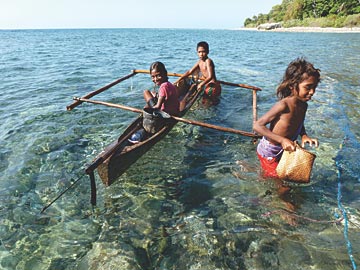Number 142 (September-December 2013)
Editorial
In the Pacific Islands region, domestic tuna fleets targeting albacore are in trouble and many boats are at anchor because of low catches and lack of profitability (see PITIA’s article - pdf: 66 KB). In 2012, scientific studies, based on data collected through 2010, showed that South Pacific albacore stocks were healthy and the level of fishing sustainable. But, as Graham Pilling explains in his article (pdf: 284 KB), there was one more essential component in the conclusions of this assessment: “despite the health of the albacore population, any increase in catches (even within sustainable levels) is predicted to have a significant impact on the catch rates in the longline fishery.” Despite the warning, more boats have been allowed to enter the fishery and albacore catches have increased by more than 30% between the periods 2001–2008 and 2009–2012. Consequently, many domestic fleets, which are not heavily subsidised, are now in trouble. An obvious remark can be drawn from this situation: without proper management, healthy stocks don’t necessarily mean healthy fisheries.
As shown in several articles of this issue, scientists keep exploring many corners of the tuna world: they read in their entrails (pdf: 348 KB), they use forensics to unlock their mysteries (pdf: 155 KB), they tag them by the hundreds of thousands (pdf: 202 KB) and they study the possible impacts of the predicted increased ocean acidification levels on their population (pdf: 386 KB). The better a resource is known, the better it can be managed. But it will only be well managed if the will to do so is genuine.
Aymeric Desurmont
Fisheries Information Specialist
In this issue
SPC ACTIVITIES
-
Is aquaponics viable in the Pacific Islands? (pdf: 238 KB)
-
Oracles read climate impact in tuna entrails (pdf: 348 KB)
-
Conservation forensics help unlock tuna mysteries (pdf: 155 KB)
-
A scientific perspective on current challenges for PICT domestic tuna longline fleets that are dependent on South Pacific albacore (pdf: 284 KB)
-
100,000 tuna tagged by one individual – A world record (pdf: 202 KB)
-
New species of deepwater snapper identified from shape of ear bones (pdf: 213 KB)
-
Standardising sea cucumber resource assessments in PICTs (pdf: 341 KB)
-
Community-based ecosystem approach to fisheries management (CEAFM) and climate change adaptation in the state of Yap, FSM (pdf: 229 KB)
-
SPC and Fiji Fisheries organise practical training on microalgae production for mariculture species (pdf: 141 KB)
-
Kiribati participates in international animal disease reporting system (pdf: 106 KB)
-
Spearfishing best practices training in Timor-Leste (pdf: 657 KB)
-
Kiribati: towards major development in small-scale tuna fisheries? (pdf: 252 KB)
NEWS FROM IN AND AROUND THE REGION
-
A small-scale tuna longliner for Kiribati (pdf: 206 KB)
-
Longlining for South Pacific albacore: The ship has sailed and the domestic industry is left to sink (pdf: 66 KB)
-
Unlocking the secrets of South Pacific tropical freshwater eels (pdf: 350 KB)
-
International workshop on “Different survey methods for coral reef fish, including methods based on underwater video” (pdf: 338 KB)
-
Juvenile reef fish can survive without mangroves on Mayotte (pdf: 404 KB)
-
Building better pearl aquaculture businesses in Fiji (pdf: 170 KB)
FEATURE ARTICLES
-
Roadmap for inshore fisheries management and sustainable development 2014–2023 (pdf: 306 KB)
-
Assessing the impacts of ocean acidification upon tropical tuna
by Don Bromhead et al. (pdf: 386 KB)



